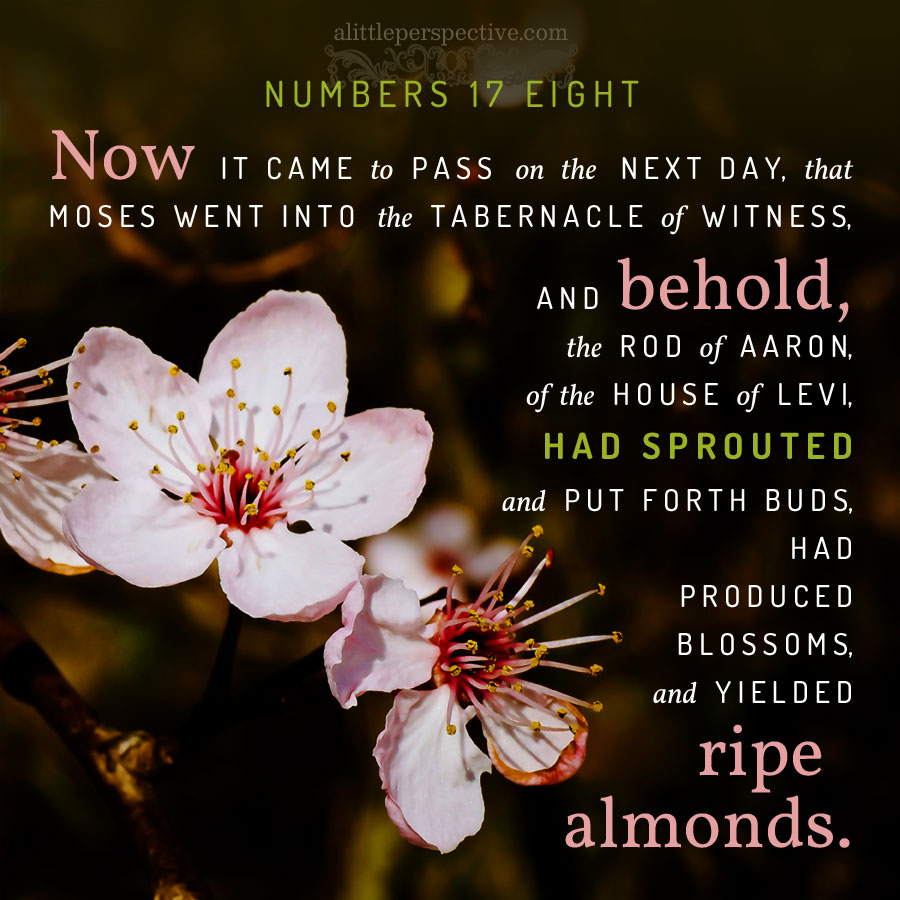Today’s Old Testament chronological reading is in Numbers 17 and 18.
The Psalms/ Proverbs reading is in Psalm 88.
The New Testament reading is Luke 18.
Today’s notes, and Hebrew root word parables.
Wrath is a recurring theme in today’s reading.
And you shall attend to the duties of the sanctuary and the duties of the altar, that there may be no more wrath of the children of Israel. Num 18:5
WRATH. Strong’s H7110 קצף qetseph; as an abstract concept, “anger;” as a concrete object, “splinter;” from Strong’s H7107 קצף qatsaph, a primitive root meaning, “to snap,” of wood, sending splinters flying; but always used in Scripture of anger.
quph ק = sun on the horizon, thus condense, circle, time
tsadey צ ץ = trail, thus a man concealed, journey, chase, hunt
pey פ ף = mouth, thus open, blow, scatter, edge
The story. The end (quph, as the sun on the horizon marks the end of the day) of the line (tsadey, as the limit of patience?), so that the mouth scatters (pey) anger as splinters of wood are scattered when the wood snaps.
*****
Your wrath lies heavy upon me, and You have afflicted me with all Your waves. Selah Psa 88:7
WRATH. Strong’s H2534 חמה chemah; an abstract concept meaning “warmth, hot displeasure;” from Strong’s H3179 יחם yacham, a primitive root meaning, “to be hot, to conceive.”
yud י = closed hand, thus work, throw, worship
chet ח = wall, thus outside, divide, half
mem מ ם = water, thus chaos, mighty, blood
The story. According to the Ancient Hebrew Lexicon, related words in this family are “cheese,” “heat,” and “sun,” because of the ancients’ method of making cheese. They poured milk in an animal skin bag, and then hung it out in the sun while pushing the bag back and forth to mix the contents. The heat and the mixing activated an enzyme which caused the milk to separate into curds and whey. The separated (chet) milk (mem, as indicative of any liquid) created cheese. Thus, working (yud, pushing the bag back and forth with the hand) to separate (chet) the milk (mem), that is, to create cheese, “to heat, to be hot” coming from the heat required to turn the milk into cheese. The verb births the daughter words of fury (hot anger), and interestingly enough, conception; we still say today that animals conceive their young when they are “in heat.”
*****
Your fierce wrath has gone over me; Your terrors have cut me off. Psa 88:16
WRATH. Strong’s H2740 charown; an abstract concept meaning, “fierce anger;” from Strong’s H2734 חרה charah, a primitive root meaning, “to be kindled,” always used of anger.
chet ח = wall, thus outside, divide, half
resh ר = head of man, thus head, first, top, beginning, man
hey ה = man w/ raised arms, thus look, reveal, wonder, worship, breath
The story. Outside (chet), the man (resh) becomes (hey) burnt if left in the sun. We are led to this story by the cognate words of “to burn,” and also, interestingly enough, “to delay,” as outside work was delayed to avoid the sun.
The wrath of God is terrifying, but the ministry of Messiah’s priesthood causes no more wrath to be upon His people. The circumcised heart reverences it and does not treat it flippantly!
Chiastic structures.
None new today.
Links to previous studies.
Numbers 17 and 18, No more wrath on Israel
Psalm 88, Chiastic Structure, The cause of wrath
Luke 18:18-30, Chiastic structure
Luke 17:11-18:43, Chiastic structure
MARCH 2021 BIBLE READING SCHEDULE | 2021 FULL YEAR READING SCHEDULE

















Leave a Reply